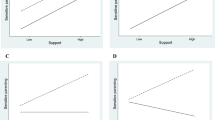Summary
¶The aim of this study was to examine parent-child interactions 15–18 months postpartum, in families where the mother either showed depressive symptoms two months postpartum or did not. Maternal mood was assessed with the Edinburgh Postnatal Depression Scale (EPDS). Eleven women scoring >12 (signs of depressive mood) and 14 women scoring <10 (no signs of depressive mood) on the EPDS and their partners were videotaped in parent-child interactions, assessed by the Parent Child Early Relational Assessment (PCERA). Our results indicate that children of high EPDS-scoring mothers showed less persistence in play with, and less joy in reunion after separation from, their mothers than children of low EPDS-scoring mothers. In contrast, most fathers in families where the mothers scored high on the EPDS seemed to establish joyful relationships with their children and secure child-father attachment 15–18 months postpartum, as if the father “compensated” for the mothers’ depressive symptoms.
Similar content being viewed by others
Author information
Authors and Affiliations
Additional information
Received February 10, 2003; accepted May 15, 2003 Published online July 3, 2003
Rights and permissions
About this article
Cite this article
Edhborg, M., Lundh, W., Seimyr, L. et al. The parent-child relationship in the context of maternal depressive mood. Arch Womens Ment Health 6, 211–216 (2003). https://doi.org/10.1007/s00737-003-0020-x
Issue Date:
DOI: https://doi.org/10.1007/s00737-003-0020-x




